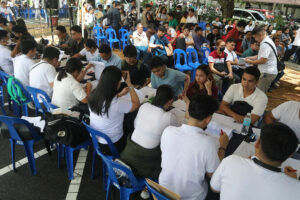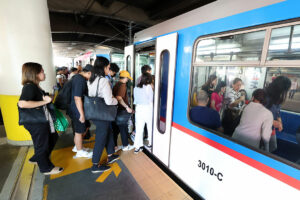The government will pivot in 2026 toward targeted job support in sectors facing worker displacement, as the Philippines looks to protect employment gains that stayed within official targets last year, Labor Secretary Bienvenido E. Laguesma said.
The Department of Labor and Employment (DoLE) would prioritize job matching and infrastructure-related opportunities for construction workers and expand emergency employment and livelihood assistance for displaced workers in agriculture and fisheries, he told BusinessWorld in a Viber message on Sunday.
The DoLE would also step up skill upgrading and reskilling programs tied to climate-resilient and more stable, year-round jobs, he added.
“For 2026, DoLE will also work closely with partner agencies on skill upgrading/reskilling on climate-resilient jobs, and more stable, year-round employment,” Mr. Laguesma said.
The shift comes after labor market indicators for 2025 landed within benchmarks set under the Philippine Development Plan. The Philippine Statistics Authority’s Labor Force Survey showed the unemployment rate rose to 4.2% in 2025 from 3.8% in 2024. The underemployment rate was unchanged at 11.9% year on year in 2025.
While the figures point to resilience in the headline labor market, the data reflect the vulnerability of construction, agriculture, and fisheries sectors to weather disruptions, project delays, and seasonal swings.
Analysts said that the December labor data mask a sharp slowdown in job creation and rising volatility in key sectors.
In December, the jobless rate rose to 4.4% from 3.1% in the same month a year ago, while the underemployment rate improved to 8% from 10.9% a year ago.
The total employed Filipinos fell by 758,000 to 49.4 million in December 2025 from 50.2 million a year earlier.
“This is only partly attributable to the corruption scandal-driven decline in construction which fell by 550,000 year on year — other sectors also shed large numbers of jobs such as agriculture, manufacturing, and transportation and storage,” Jose Enrique “Sonny” A. Africa, executive director of think tank IBON Foundation, said.
For the full year, he noted there were only around 172,000 jobs added from 2024, “barely one-fourth of the historical average of around 700,000 annually in the last 50 years.”
“It is also the fifth worst year of job creation after contractions in 2000, 2017, 2019 and 2020 and just a 90,000 increase in 2015,” Mr. Africa said.
“Looking beyond just December round data, it is clear that the labor market is characterized by weakening job creation and extreme volatility,” he added.
Santiago Nolla, president of the National Union of Building and Construction Workers, said there were already massive layoffs in the construction industry in August 2025 as projects tied to anomalous flood control contracts stalled.
“We were no longer surprised because workers had already been feeling the impact, as early as August 2025 when the flood control scandal erupted, there was massive displacement of workers employed by the identified contractors,” he said.
Mr. Nolla urged the government to accelerate the resumption of projects, expand free training through the Technical Education and Skills Development Authority, and prioritize local hiring of displaced workers once project implementation restarts.
John Paolo R. Rivera, a senior research fellow at the Philippine Institute for Development Studies, said the services sector continued to cushion the broader labor market.
“The strong hiring in BPOs (business process outsourcing) and tourism-related services suggests that the Philippine labor market remains structurally resilient, with services continuing to act as a shock absorber when public spending and investment weaken,” he said.
“Looking ahead, policymakers should closely monitor business sentiment, tourism recovery, digital economy expansion, and global demand for outsourced services, as these will sustain services-led hiring,” he added.
Rizal Commercial Banking Corp. Chief Economist Michael L. Ricafort said government underspending on infrastructure in late 2025, the exit of Philippine offshore gaming operators, and weaker investor sentiment were all major drags on employment last year.
“Going forward, catch-up spending of the government especially on infrastructure to make up for the softness in the latter part of 2026 based on priority anti-corruption/good governance measures and reforms… could help boost economic activities that would fundamentally lead to better local employment data,” Mr. Ricafort said. — Erika Mae P. Sinaking







 DOWNLOAD
DOWNLOAD













